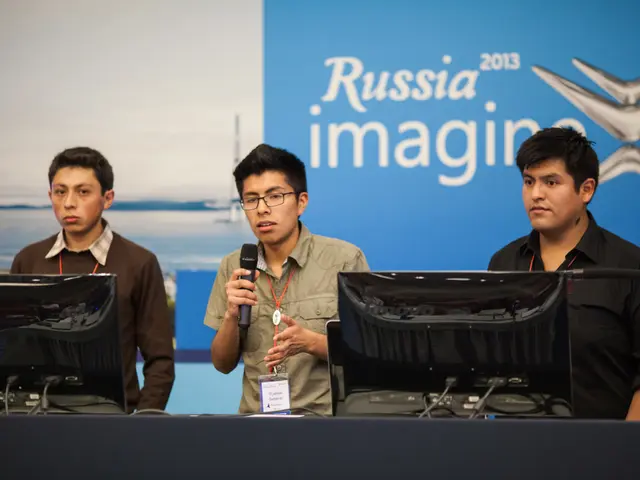Russia intends to educate over half a million individuals in digitalization-related programs
The Digital Shift by 2030 in Russia
By the year 2030, a massive focus is placed on equipping Russians with digital skills, with the aim to train around 600,000 individuals in tech-related professions. This ambitious plan, revealed in a study by the Gaidar Institute on international approaches to governing the digital economy, underscores Russia's commitment to digital transformation.
The report highlights the looming threat of job displacement due to automation, with sectors like retail not being spared. For example, the installation of self-service terminals by major retail chains has affected hundreds of thousands of cashiers. To combat this, free and subsidized courses are being developed at the national level, supervised by the Ministry of Digital Development.
The Russian regions are actively participating in this educational drive. Over the past four years, the Leningrad region has trained 19,000 individuals, while the Rostov region hosted the "Digital Professions" festival. Between 2019 and 2023, 48 regions have partaken in such projects, with 74% of the students residing outside major cities.
Researcher Kirill Chernovol from the institute reported that the Ministry of Digital Development collaborates with 29 educational providers, such as ITMO and Bauman MGTU, to offer courses in fields like data analytics, development, cybersecurity, and digital marketing. The statistics show that 60% of graduates experienced wage increases, with half seeing an uptick of over 75%.
However, Chernovol also acknowledged potential risks, including the possibility of wage drops and information security threats due to mass-producing inexperienced specialists. Moreover, rapid market growth could lead to low-quality courses, necessitating employers to conduct additional checks.
Previously, it was reported in Russia that certain specialists might be replaced by artificial intelligence.
As part of Russia's national initiatives, the focus is on enhancing technological sovereignty and digital transformation, and key areas include:
- Enhancing skills in programming languages: A federal project is aimed at teaching programming languages to 80,000 schoolchildren annually, with a goal of 400,000 students by 2030. The focus languages include Python, Java, C++, JavaScript, PHP, Kotlin, TypeScript, C#, and Go[4].
- Advancements in Artificial Intelligence: South Ural State University is developing top-tier academic programs in AI under the "Artificial Intelligence" Federal Project. This initiative entails creating a dedicated AI research center in collaboration with industrial partners[5].
Economic growth, technological sovereignty, and social impact are the potential benefits of these initiatives. However, infrastructure development, curriculum relevance, and scalability pose challenges that must be addressed for their success. These endeavors demonstrate Russia's strategic effort to build a competent digital workforce that drives national technological innovation and economic growth.
In the context of Russia's digital shift by 2030, the Ministry of Digital Development collaborates with educational providers like ITMO and Bauman MGTU to offer courses in technology-related fields such as data analytics, development, cybersecurity, and digital marketing.
Moreover, the government is focusing on enhancing technological sovereignty, with a federal project aimed at teaching programming languages to 80,000 schoolchildren annually, including Python, Java, C++, and others, with the goal of 400,000 students by 2030. This initiative underlines the importance of technology in both education-and-self-development and finance, as Russia strives to build a competent digital workforce that drives national technological innovation and economic growth.








